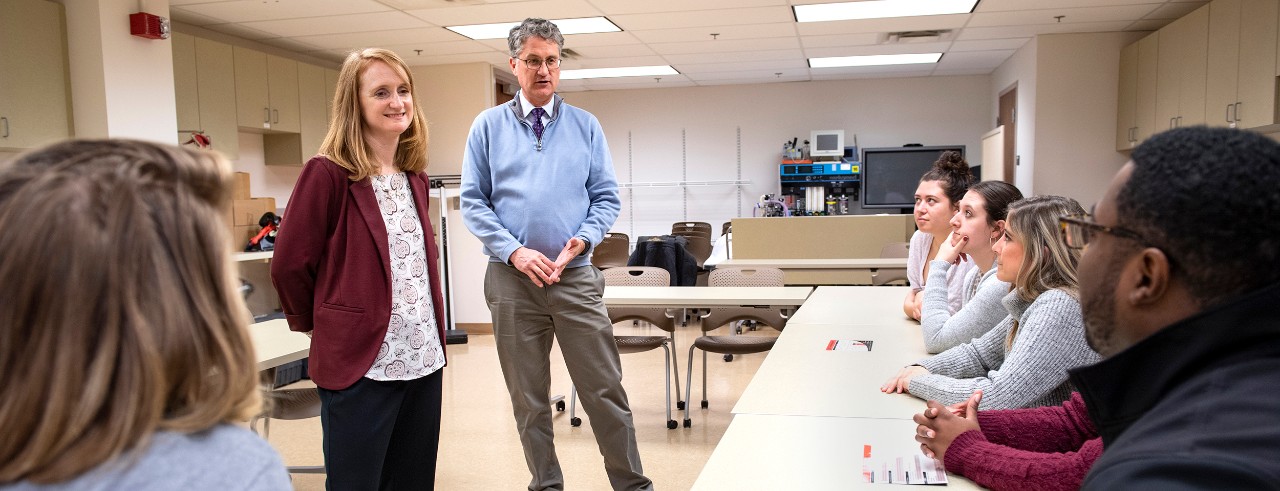
Training UC students to treat substance use disorders
CAHS and CECH collaborate to place graduate students in counseling and social work at Federally Qualified Health Centers
The School of Social Work in the University of Cincinnati (UC) College of Allied Health Sciences (CAHS) is collaborating with the Counseling Program in the College of Education, Criminal Justice, and Human Services (CECH) on a two-year $400,000 Behavioral Health Workforce Education and Training program grant from the Health Resources and Services Administration. The grant will recruit and train 14 Master of Social Work and six Master of Counseling students who will be working at a Federally Qualified Health Center (FQHC) that is integrating substance use disorder (SUD) treatment.
“Often times when we think about SUD treatment, we think about it in this separate entity providing separate services and not connected to deal with any other issues related to physical health,” says Shauna Acquavita, PhD, associate professor in the School of Social Work. “This is set up so that it’s a one-stop shop for people. They can come in to the FQHC, and they can get treatment for their health conditions, and then they can get their SUD treatment as well.”
Working with Michael Brubaker, PhD, associate professor and director of the Counseling Program in the School of Human Services, Acquavita is heading up the program which will have the students working at the FQHC with a variety of medical professionals including physicians, nurse practitioners, nurses and medical assistants. One of the FQHCs where the students will train is WinMed Health Services, which has locations in Cincinnati’s West End, Bond Hill, Winton Hills and seven area schools.
“Counseling students may better understand their own strengths and professional role by having knowledge of the strengths of social workers and other professionals through such collaborations,” says Brubaker.
One of the established goals of the grant is to recruit at least 30 percent of the graduate students from underrepresented minority backgrounds and/or disadvantaged communities, including Appalachia.
“We are looking for people to be able to serve some at-risk populations and often times we have individuals who are in poverty and when they go to get care they may not see people who also have had similar experiences or who have been raised in a similar neighborhood or in similar ways,” Acquavita says. “This way, they’re able to feel more comfortable with people who have similar backgrounds and the students understand the culture that these individuals come from and can approach it in a culturally competent way.”
Acquavita says the students choose from a variety of courses for training, including screening, brief intervention and referral to treatment (SBIRT), which has been an area of research focus for her in the past, including a larger grant from 2018 of which this grant is a subset. The students will learn about medication-assisted treatments in combination with counseling and behavioral therapies to provide a “whole-patient” approach to the treatment of substance use disorders.
“Substance use disorder impacts all populations that these students will serve,” says Acquavita. “We give them the tools to be able to address these issues. The sooner you address these issues, the better the prognosis is for these individuals.”
The grant began in September 2018 and runs through September 2020. Acquavita says she hopes she can continue the program and partnership with WinMed after the grant has finished. Continuing education programs is one option, as is certification programs for people to help address SUD, and not just focus on opioid use.
“I think that there’s going to be other drugs that you’re going to need to address, so just providing people focusing on opioids only is short-sighted,” says Acquavita. “We need to train people to be able to address all drugs whether it be methamphetamine, which is a huge issue, or issues related to vaping and marijuana in youth. There are so many issues to address currently that, in part, our issue with addressing just opioids and just having money address that, it limits the scope of our ability to help each other and to work together on a specific problem.”
Related Stories
President Pinto announces interim provost
April 8, 2025
UC President Neville Pinto announced that Dr. John Weidner, dean of the College of Engineering and Applied Science, will step in as interim provost following Dr. Kristi Nelson's departure on June 1.
ChemoID test leads to better outcomes in platinum-resistant...
April 7, 2025
MSN and MSN UK highlighted results from a new Phase 3 trial published in the journal npj Precision Oncology that found a cancer stem cell test can accurately choose more effective treatments and lead to improved outcomes for patients with platinum-resistant ovarian cancer.
OTR mural celebrates UC alumni success
April 4, 2025
The UC Alumni Association, UCAA, will mark its annual Alumni Celebration during its upcoming Alumni Week, April 7-13, with a community art project commemorating this year’s slate of alumni honorees receiving the organization’s top awards.
